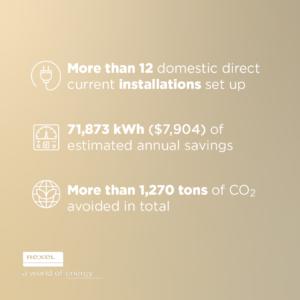
GRID Alternatives eases Native American tribal communities’ access to photovoltaic power
The Rexel Foundation renewed its support in 2020 for the GRID Alternatives organization’s National Tribal Solar Program. This program facilitates Native American communities’ access to photovoltaic power and vocational training to enable them to locally sustain the use of this energy. Through this partnership, the equivalent of 45 kW of direct current was installed on behalf of the Eastern Navajo Agency.
A high-impact project for Native American communities
The systems that GRID Alternatives offers households provides them with access to a clean, local, and renewable source of electric power, enabling them to reduce their electricity bills by 75% to 90% on average, thereby contributing to local growth through budget savings.
More broadly, this project aims to address the challenges faced by Native American communities’ by funding their access to energy, which has a high-cost relative to their disposable income. Households in energy poverty situations depend on support programs funded by tribal communities for their energy supply, meaning that a large part of these communities’ resources go to paying energy bills.
A multifaceted approach designed to achieve sustainable development for communities
GRID Alternatives’ support enables communities to make the most of their land’s solar potential. They are therefore increasingly moving towards renewable energies and are looking to develop their own photovoltaic systems. The organization’s National Tribal Solar Program is based on a multifaceted approach that makes it possible to install solar panels in remote regions, which are currently underserved by companies in the sector. These installations generate vital energy savings for these populations. Each project brings the benefits of solar power to the community and provides vocational development opportunities. By working with tribal leaders on energy resource planning, GRID Alternatives also educates them on the challenges linked to energy management, energy efficiency, and energy savings.
Significant results for a long-term energy transition
The project includes several off-grid 3 kW direct current domestic installations. It also accounts for 12 domestic 3 kW direct current installations connected to the network. Lastly, it includes a 6 kW direct current installation connected to the network serving the administrative center of the Torreon Chapter, a rural community located on the Navajo territory.
The goal of the installations connected to the networks is to generate an estimated annual savings of 71,873 kWh, or $7,904, equivalent to the annual electricity consumption of six people. Over the 25 years that the installations will operate, the systems connected to the grid are expected to generate 1,796,825 kWh, saving $197,600, equivalent to the annual electricity consumption of 140 people. In addition, thanks to the clean electricity produced, 1,270 tons of CO2 are expected to be avoided.
The construction project also provides hands-on training opportunities for students looking to gain experience in solar panel installation. The organization’s collaboration with three universities and a local high school trains around 30 students throughout the length of the project. By guaranteeing the longevity of the installation and the long-term use of solar power within Native American communities, this training is therefore a key element of the system.
GRID Alternatives and its efforts
In 2020, the Rexel Foundation provided funding for GRID Alternatives’ National Tribal Solar Program. The goal of the organization, based on the conviction that a rapid and equitable transition to a world using renewable energies must benefit everyone, is aligned with the Foundation’s purpose.
| GRID Alternatives is a certified non-profit organization, based in Oakland, California, with eight affiliate offices serving California, Colorado, Washington D.C., Virginia, Maryland, and Delaware. It also has a national program dedicated to Indigenous Tribes and an international program active in Nicaragua, Nepal, and Mexico. |


